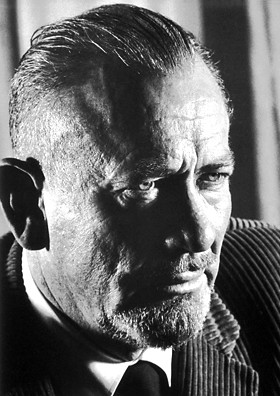John Steinbeck Berühmte Zitate
Zitate über Männer von John Steinbeck
Zitate über Menschen von John Steinbeck
Von Mäusen und Menschen, Deutscher Taschenbuch Verlag, München 2007, ISBN 978342310797-6, Seite 78
"Books ain't no good. A guy needs somebody — to be near him." He whined, "A guy goes nuts if he ain't got nobody. Don't make no difference who the guy is, long's he's with you. I tell ya," he cried, "I tell ya a guy gets too lonely an' he gets sick." - Of Mice and Men, books.google http://books.google.de/books?id=6DdcE521-BAC&pg=PA64
John Steinbeck Zitate und Sprüche
Tortilla Flat, The New American Library of World Literature Inc, New York 1959, S. 57, Übersetzung: Nino Barbieri
Original engl.: "In civilian life, one is punished for things one does; but army codes add a new principle to this – they punish a man for things he does not do."
John Steinbeck: Zitate auf Englisch
Quelle: The Winter of Our Discontent (1961), Part One, Chapter III
Quelle: The Winter of Our Discontent (1961), Part One, Chapter II
“He wasn't involved with a race that could build a thing it had to escape from.”
Pt. 3
Travels With Charley: In Search of America (1962)
Pt. 2
Travels With Charley: In Search of America (1962)
“Prayer never brought in no side-meat. Takes a shoat to bring in pork.”
The Grapes of Wrath (1939)
“There's nobody as lonely as an all-married man.”
Quelle: The Winter of Our Discontent (1961), Part Two, Chapter XXI
“Four hoarse blasts of a ship’s whistle still raise the hair on my neck and set my feet to tapping.”
Pt. 1
Travels With Charley: In Search of America (1962)
As quoted in A Short History of Progress (2004) by Ronald Wright. This has since been cited as a direct quote by some, but the remark may simply be a paraphrase, as no quotation marks appear around the statement and no earlier publication of this phrasing has been located.
This is perhaps an incorrect quote from Steinbeck's article "A Primer on the '30s." Esquire, June 1960: 85-93.
"Except for the field organizers of strikes, who were pretty tough monkeys and devoted, most of the so-called Communists I met were middle-class, middle-aged people playing a game of dreams. I remember a woman in easy circumstances saying to another even more affluent: 'After the revolution even we will have more, won't we, dear?' Then there was another lover of proletarians who used to raise hell with Sunday picknickers on her property.
"I guess the trouble was that we didn't have any self-admitted proletarians. Everyone was a temporarily embarrassed capitalist. Maybe the Communists so closely questioned by the investigation committees were a danger to America, but the ones I knew—at least they claimed to be Communists—couldn't have disrupted a Sunday-school picnic. Besides they were too busy fighting among themselves."
Disputed
Quelle: "John Steinbeck once said that socialism never took root in America because the poor see themselves not as an exploited proletariat but as temporarily embarrassed millionaires", [Ronald, Wright, A Short History of Progress, 2004, 124, Anansi Press, Toronto, https://books.google.com/books?id=nzWPFQIEvfEC&q=%22temporarily+embarrassed+millionaires%22#v=snippet&q=%22temporarily%20embarrassed%20millionaires%22&f=false]
“The profession of book-writing makes horse-racing seem like a solid, stable business.”
The Acts of King Arthur and His Noble Knights (1976), but a statement he is first quoted as having made in Newsweek (24 December 1962)
Nobel Prize acceptance speech (1962)
Quelle: The Log from the Sea of Cortez (1951), Chapter 4
Nobel Prize acceptance speech (1962)
The Winter of Our Discontent (1961), unplaced by chapter
Variante: It is odd how a man believes he can think better in a special place. I have such a place, have always had it, but I know it isn't thinking I do there, but feeling and experiencing and remembering. It's a safety place — everyone must have one, although I have never heard of a man tell of it.
Mordeen on her love for Joe Saul in Act One: The Circus
Burning Bright (1950)
Quelle: The Winter of Our Discontent (1961), Part One, Chapter V
George; "buck" here means to work at lifting and throwing the sacks of barley
Of Mice and Men (1937)
“Unless a reviewer has the courage to give you unqualified praise, I say ignore the bastard.”
As quoted by John Kenneth Galbraith in the Introduction to The Affluent Society (1977 edition)
Pt. 4
Travels With Charley: In Search of America (1962)
“All men are moral. Only their neighbors are not.”
Quelle: The Winter of Our Discontent (1961), Part Two, Chapter XI
The Winter of Our Discontent (1961), unplaced by chapter
“A little hope, even hopeless hope, never hurt anybody.”
The Winter of Our Discontent (1961), unplaced by chapter
